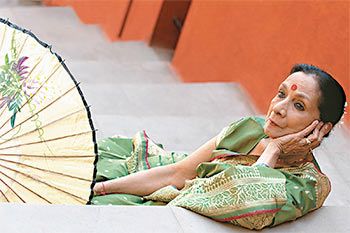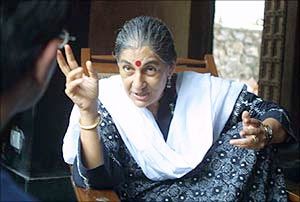
'Though she was deeply religious, she was against communalism. Whenever she got the chance, she did speak out against the communalisation of society.'
 In a family that dazzled with luminaries -- her mother Ammu Swaminadhan was a powerful force in the freedom movement in South India; her sister Colonel Laxmi Sahgal led the women's regiment in Netaji Subhas Chandra Bose's Indian National Army; her husband Vikram Sarabhai nurtured India's space programme -- Mrinalini Sarabhai, left, charted her own course.
In a family that dazzled with luminaries -- her mother Ammu Swaminadhan was a powerful force in the freedom movement in South India; her sister Colonel Laxmi Sahgal led the women's regiment in Netaji Subhas Chandra Bose's Indian National Army; her husband Vikram Sarabhai nurtured India's space programme -- Mrinalini Sarabhai, left, charted her own course.
She channelled her passion for dance to popularise it across the world, nurtured India's cultural heritage through her dance academy, Darpana, and raised her voice for social causes, particularly those dealing with women and violence.
Former MP Subhashini Ali, the daughter of Colonel Lakshmi and Colonel Prem Sahgal, pays tribute to her formidable aunt.
I was very fortunate in the sense that, from my childhood, I was very close to my aunt Mrinalini Sarabhai.
I spent a lot of time with her over the years. I was very fond of books, enjoyed watching her performances, so I used to spend school holidays with her and her children.
Her contribution is, in many ways, both unique and lasting.
For one thing, she was one of the first people to take the classical dance forms, Bharata Natyam and Kathakali, abroad at a time when it was not easy to do so. They had to travel under difficult conditions. There was very little money, both from the Government of India and whoever was inviting them.
But she took that as a kind of mission and she introduced huge audiences in the West, China, Japan and the United States to Bharata Natyam and Kathakali, which they had not been exposed to at all. That was amazing.
Then, in Ahmedabad, Gujarat, where they knew nothing about these things, she started Darpana (her cultural academy) and she started her troupe. Not only did she have her group dance Kathakali and Bharata Natyam, she also started teaching these dance forms and Kuchipudi and other dance forms. She then expanded into theatre, puppetry and so many other art forms.
Darpana is a real cultural centre which has made a huge contribution to cultural life and activity in Gujarat and Western India.
She was a purist who was committed to the classical vocabulary of dance. At the same time, she was not afraid to experiment using that vocabulary for contemporary themes that protested against women's oppression and violence.
She used her art to depict important social problems and choreographed dance dramas on these themes much before anybody else did. She was a real pioneer in that sense.
She was a remarkable person who, till the last, was very agile in her mind.
She was committed to social issues. Though she was a deeply religious woman, she was against communalism. Whenever she got the chance, she did speak out against the communalisation of society that is taking place.
She took a stand in Gujarat when very few people had the courage to do so. She took a stand against the (Gujarat) riots and against what she felt the government was doing wrong.
I can't say anything about anybody's role in history, but what she and my mother (the late Colonel Lakshmi Sahgal) and other women have done, which was beyond their own sphere, was to give a lot of women from less privileged backgrounds the confidence that they could also excel and make a mark.
I think that was the impression they left on many, many, women for several generations.
They were great pioneers and they just went ahead because they derived a lot of confidence from the fact that their parents were very supportive, very democratic.
For a woman in our kind of society to be able to do so much outside the home is amazing. One of the biggest strengths when you do something like this is the support you get from members of your family.
Apart from her inherent talent and her absolute commitment to her mission, which was dance, the fact was that she had the support both of her mother (Ammu Swaminadhan, a quiet but impactful force from South India during the freedom movement) earlier and her husband (Dr Vikram Sarabhai, regarded as the father of India's space programme) later. This made a lot of difference and made it possible for her to do a lot of what she did.
Both my mother and my aunt married men who were very democratic and supportive. So they just went ahead and did what they thought was important and what they thought was necessary without ever losing their sense of service to society.
I don't think she felt the weight of her family's background because she was one of the people who were important. It is all of us who are much less talented and much less able to do things who have felt the weight; they most certainly didn't.
 You can't separate one person's influence from another person's influence, but I would say she certainly opened my eyes to the beauty of dance and music. She was one person who always brought me lots of books.
You can't separate one person's influence from another person's influence, but I would say she certainly opened my eyes to the beauty of dance and music. She was one person who always brought me lots of books.
In these many ways, I think she had a lasting influence on me, my love of books and in inculcating at least some sensitivity in me towards culture and dance.
Subhashini Ali (above) spoke to Savera R Someshwar/Rediff.com
Photograph, Mrinalini Sarabhai: Kind courtesy Saurabh Dutta/Harmony magazine
Photograph, Subhasini Ali: Jewella Miranda/Rediff.com










